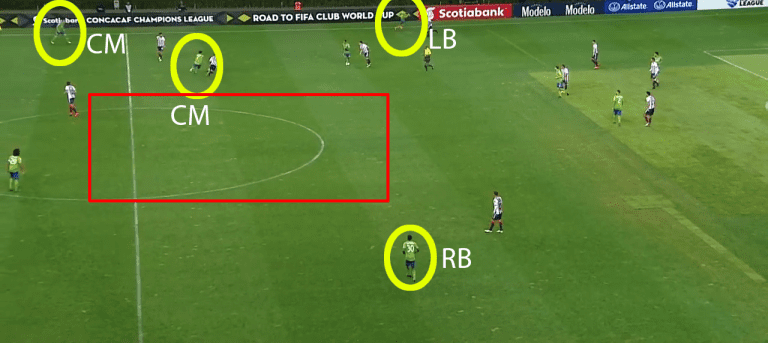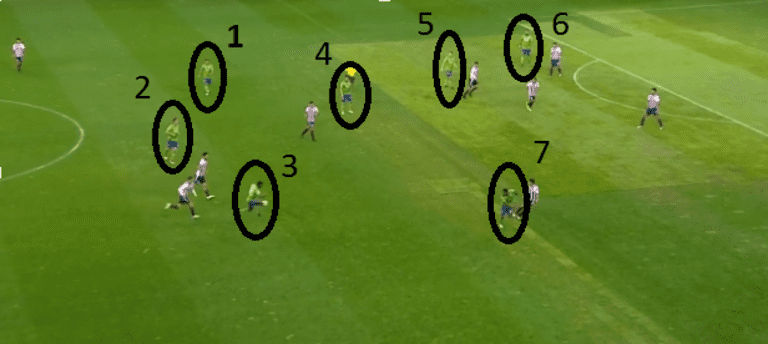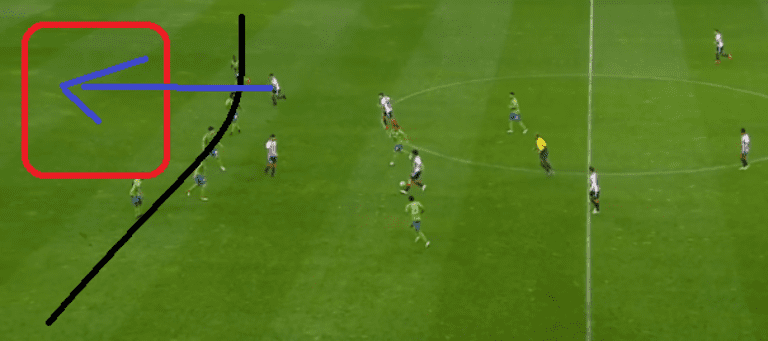Let's start here: The Seattle Sounders had a difficult task Wednesday night. They were on the road in Mexico, at altitude in Guadalajara, missing five key players at kickoff. Midway though the first half, they lost two additional starters; the squad that ultimately lost 3-0 (3-1 aggregate) is not likely the squad head coach Brian Schmetzer would liked to have fielded.
That said, the Sounders should be furious with themselves.
By most any statistical measure, the Sounders didn’t play well. Their passing stats – .335 of possession; a .56 pass completion percentage to Chivas’ .85; just 146 completed passes to Chivas’ 418 – were bad, and they never really looked likely to score.
But Seattle still had a path to victory. The Sounders didn’t lose the game because they lacked sharpness or struggled to connect passes or were missing key players. They lost the game because they allowed two goals in transition when they were tied against a superior team on the road. They lost the game because they messed up simple soccer decisions.
While I usually work hard to defend players and acknowledge soccer is a difficult sport, I’m also tired of these things happening to MLS and US national teams in key moments. To get caught in transition on the road against a superior team – when you didn’t even need to score – is simply not okay.
I understand when players have bad games or struggle technically on a night. Those things happen. But to lack focus or fail to make wise decisions, to make fundamental errors in preparing a game plan and/or sticking to the tacticsm, those can be controlled.
Entering the match, on aggregate, Seattle were winning. Another goal would have been nice, but they didn’t need it. I can sometimes be persuaded that it’s OK to go for the kill early – but not when you’re as outmatched as Seattle were Wednesday. Whether Chivas is an overall better team is debatable, but whether Chivas is better than a Sounders team missing seven key players, that's pretty clear. In terms of risk-reward, it shouldn’t even have been a question: the Sounders' first priority was ensuring Chivas didn’t score.
I say this in almost everything I write and yet I could never say it enough: It’s exponentially more difficult to score against a set, organized defense than it is to score in transition. That’s how you win against a better team on the road. You wait and coax them into errors. You can still attack, but it needs to be within the template of the larger picture, playing decent soccer while also recognizing the moments that put you at risk. The outside defender holding his position and not leaving the channel open is more important than the outside defender overlapping and getting off a cross.
It can be difficult at times on the field, admittedly, to notice the moments when you need to play it safe. Yet Wednesday night was so clearly that night, and Seattle either had a poorly planned concept going into the game (which rests on Brian Schmetzer’s shoulders) or the team didn’t execute the game plan (which rests on the players).
Here’s a still image from the moments before Chivas scored the first goal:

Prior to the first goal, Seattle's positioning opened a wide gap for Chivas to exploit.
Note both Sounders outside backs are forward, and neither defensive midfielder is protecting the space in front of the outside backs – the most vital space in defensive transitions. This isn't a team focused on not conceding first. In the next few seconds, Cristian Roldan loses the ball and Chivas goes down the field before Seattle can get set, ultimately winning the free kick that leads to the goal.
If we look at the second goal, we see a similar picture:

Even with the score tied, Seattle flooded the attacking half vs. Chivas.
Seven Sounders players are in line with or ahead of the ball there. At this point, Seattle still doesn’t need to score; the game is tied. Seattle is still tied on the road to a superior opponent. They can still win in penalties. While they might want the goal to avoid extra time or penalties, they still have to consider which is more likely: scoring a goal or conceding a goal?
Prior to the second goal, Jordan McCrary loses the ball, and a single pass puts Chivas sprinting toward an exposed Sounders backline.
Finally, if we look at the last defending moment before the crucial goal, the Sounders make another mistake in transition: they stop backtracking. Chivas chips a ball behind their defenders and Javier Lopez is 1-v-1 with Stefan Frei. They shouldn't have stopped their defensive line so hard. Drop to the danger zones and it would have been much more difficult for Chivas to attack. It’s a simple soccer concept.

We all saw where this was headed from the chip.
Too often we discuss soccer and wins and losses in terms of talent and resources. But the ability to think and plan are independent of technical talent and investment. We can, however, control the way we think about the game. For all the frustration of Seattle's struggles with the ball at their feet, it was mental mistakes that cost them the quarterfinal.













